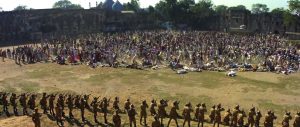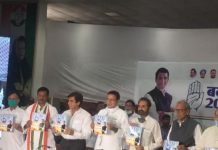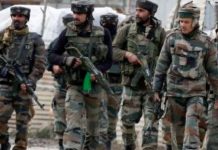 British Prime Minister Theresa May recently described the Jallianwala Bagh massacre in Amritsar in 1919 as a “shameful scar” on British Indian history but stopped short of a formal apology sought by a cross-section of parliament in previous debates. In a statement, marking the 100th anniversary of the massacre, at the start of her weekly Prime Minister’s Questions in the House of Commons on April 10, she reiterated the “regret” already expressed by the British government.
British Prime Minister Theresa May recently described the Jallianwala Bagh massacre in Amritsar in 1919 as a “shameful scar” on British Indian history but stopped short of a formal apology sought by a cross-section of parliament in previous debates. In a statement, marking the 100th anniversary of the massacre, at the start of her weekly Prime Minister’s Questions in the House of Commons on April 10, she reiterated the “regret” already expressed by the British government.
The massacre took place in Jallianwala Bagh in Amritsar on Baisakhi in April 1919 when the British Indian Army troops, under the command of Colonel Reginald Dyer, fired machine guns at a crowd of people holding a pro-independence demonstration. Colonial-era records show about 400 people died in the northern city of Amritsar when soldiers opened fire on men, women and children in an enclosed area, but Indian figures put the toll at closer to 1,000.
“The tragedy of Jallianwala Bagh of 1919 is a shameful scar on British Indian history. As Her Majesty the Queen (Elizabeth II) said before visiting Jallianwala Bagh in 1997, it is a distressing example of our past history with India,” she said in her statement. “We deeply regret what happened and the suffering caused. I am pleased that today the UK-India relationship is one of collaboration, partnership, prosperity and security. Indian diaspora make an enormous contribution to British society and I am sure the whole House wishes to see the UK’s relationship with India continue to flourish.”
In response, Opposition Labour Party Leader Jeremy Corbyn demanded that those who lost their lives in the massacre deserve a “full, clear and unequivocal apology for what took place”. May’s statement comes a day after British MPs at Westminster Hall of the Parliament complex debated the issue of a formal apology for the April 13, 1919 massacre to mark its centenary.
Foreign Office Minister Mark Field had told MPs that he had been “compelled” by the arguments to raise the issue of going further than the “deepest regret” expressed over the killings during the British Raj. “I feel that we perhaps need to go further… I have now been persuaded – not just by this debate – to take a different approach,” the minister said, adding that the government had to also consider the “financial implications” of any apology for events of the past.
“These issues are an important way of trying to draw a line under the past. Therefore, this is work in progress and I cannot make any promises,” he said, holding out some hope of a formal apology over the incident.
The debate was tabled by Conservative Party MP Bob Blackman, who opened proceedings with a strong sentiment of “shame” as he called on the British government to apologise. “General Dyer was vigorously defended by — I say this with shame — the Conservative party, as well as most of the military establishment. He evaded any penalties post inquiry, as his military superiors advised that they could find no fault with his actions, his orders, or his conduct otherwise,” Blackman said, in reference to the British general who had ordered the shooting at a Baisakhi gathering in Amritsar 100 years ago.
“As we approach the 100th anniversary of the Jallianwala Bagh massacre in Amritsar on 13 April 1919, it is clear that there needs to be a formal apology from the United Kingdom government that accepts and acknowledges their part in the massacre,” said Indian-origin
Labour MP Preet Kaur Gill. “This is the right time for the (British) Prime Minister to publicly apologise,” added fellow Labour MP Virendra Sharma.
In wrapping up the outcomes of the debate, Blackman concluded that children in British schools should be taught about the tragedy because people should know what happened in Britain’s name and that “saying sorry — apologising for this massacre — is the right thing to do”.
The pressure on the Cabinet minister mounted further as he received a letter signed by 80 MPs stressing that he must consider their call for an “apology anew”. “Relations between the UK and India today are friendly and constructive. Yet that does not mean an apology would not be good,” notes the letter, initiated by Labour MP Pat McFadden.
During a previous debate in the House of Lords earlier in the year, it was confirmed that UK foreign secretary Jeremy Hunt was “reflecting” on demands for a formal apology to mark the centenary of the Jallianwala Bagh massacre this week. Following May’s latest statement on the issue in the Commons, it remains to be seen if the UK government will follow up with any further statements in the lead up to the 100th anniversary on Saturday.
Earlier, the UK government had flagged “financial implications” as one of the factors it had to consider while reflecting upon demands for a formal apology for the Jallianwala Bagh massacre.
UK Foreign Office minister Mark Field told a debate on “Jallianwala Bagh massacre” at Westminster Hall in the House of Commons complex that while it was important to draw a line under the past over the “shameful episode” in history, repeatedly issuing apologies for events related to the British Raj came with their own problems.
“I have slightly orthodox views on Britain’s colonial past. I feel little reluctant to make apologies for things that have happened in the past,” the minister said. “There are also concerns that any government department has to make about any apology, given that there may well be financial implications to making an apology. I feel we perhaps debase the currency of apologies if we are seen to make them for many, many events.”
However, while reiterating the UK government’s “deepest regret” over the massacre in Amritsar on April 13, 1919, Field stressed that the issue of appropriately marking the sombre 100th anniversary remains a “work in progress” and an active debate was taking place amongst ministers and senior officials.
“Importantly, our modern relationship with India is focussed on the future, on pooling our strengths However, I also recognise that the relationship is framed in part by the past,” Field said, adding that he had been “compelled” by the latest debate to take a message back to Downing Street that perhaps a little more is required than the “deep regret” already expressed by the UK government.
“Something is holding us back fulfilling the full potential of the flourishing relationship (with India) and I do accept that it (Jallianwala Bagh) perhaps grates particularly strongly,” the minister said.
Veteran Indian-origin Labour MP Virendra Sharma called for a formal apology to be made by British Prime Minister Theresa May, with others echoing the demand and also raising the prospect of a physical memorial to be constructed in memory of those who lost their lives.
Many of the MPs included an account of General Dyer firing on a Baisakhi gathering at Jallianwala Bagh in Amritsar on April 13, 1919, without warning and blocking the main exit of the park with his soldiers and armoured vehicles. Dyer is recorded as having continued to fire for 10 minutes even as the thousands gathered in the grounds tried to escape, leaving thousands dead and injured.
Blackman, in wrapping up the outcomes of the latest UK parliamentary intervention over the massacre, said the key messages that came out of the debate was that the incident must form part of the school curriculum in the UK and that a formal apology for the incident remains the “right thing to do”.
The Westminster Hall event follows a debate in the House of Lords in February, when a government minister had confirmed that UK foreign secretary Jeremy Hunt was “reflecting” on demands for a formal apology to mark the centenary of the Jallianwala Bagh massacre this month. In their capacity as members of a newly-formed Jallianwala Bagh Centenary Commemoration Committee (JBCC), Indian-origin peers Lord Meghnad Desai and Lord Raj Loomba had also written to Theresa May calling for a formal apology.
The JBCC, chaired by businessman and philanthropist Sardar Balbir Singh Kakar and made up of a number of Indians and non-resident Indians (NRIs) including members of the International Punjab Forum, is planning a commemorative event in the House of Lords on Saturday to mark the centenary of the massacre on April 13, 1919.
letters@tehelka.com












